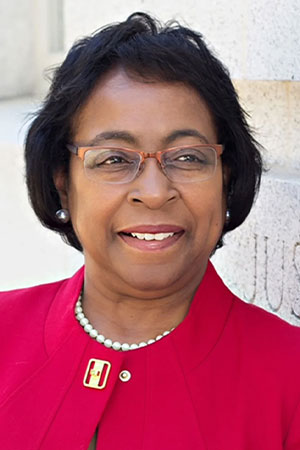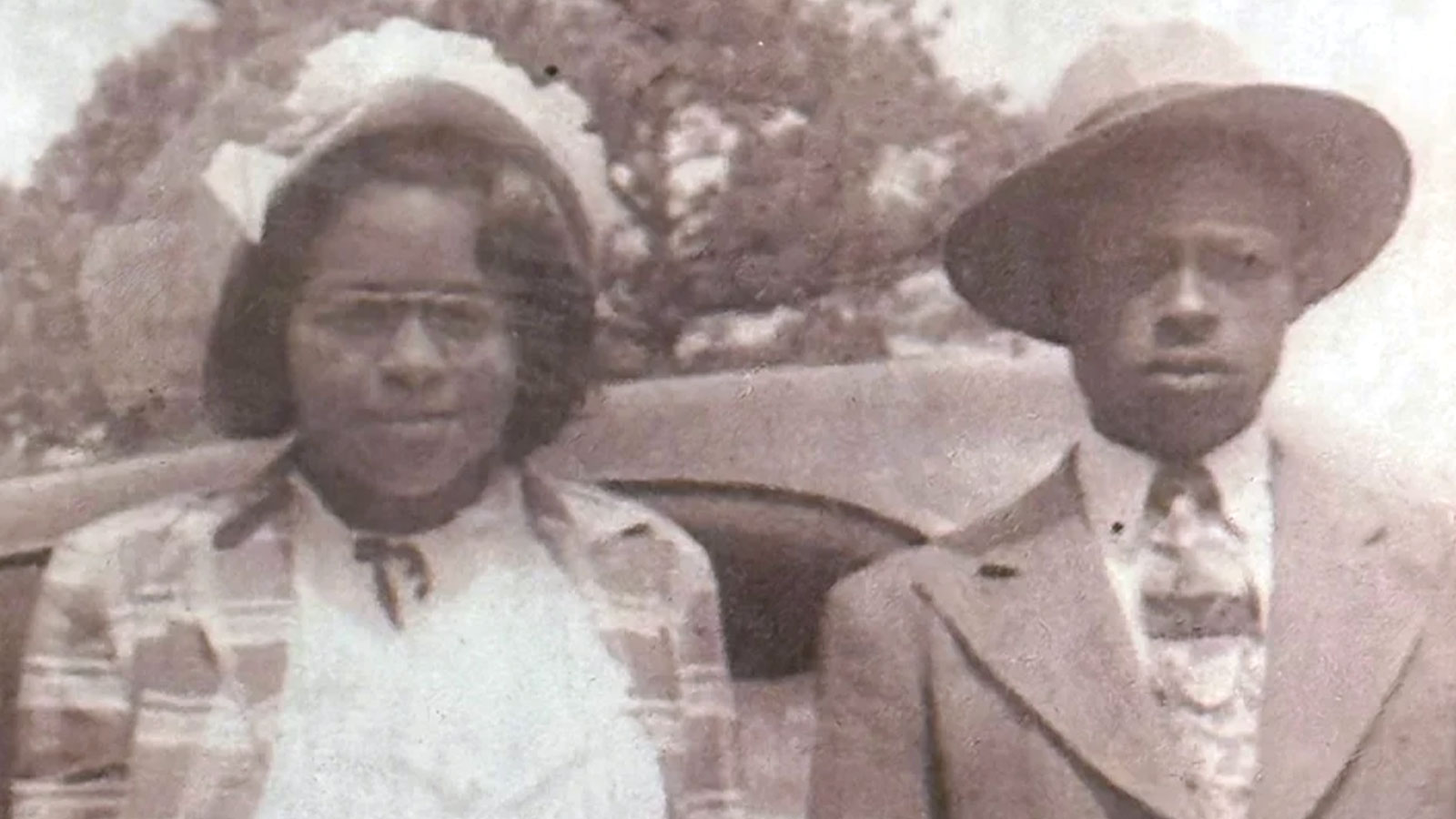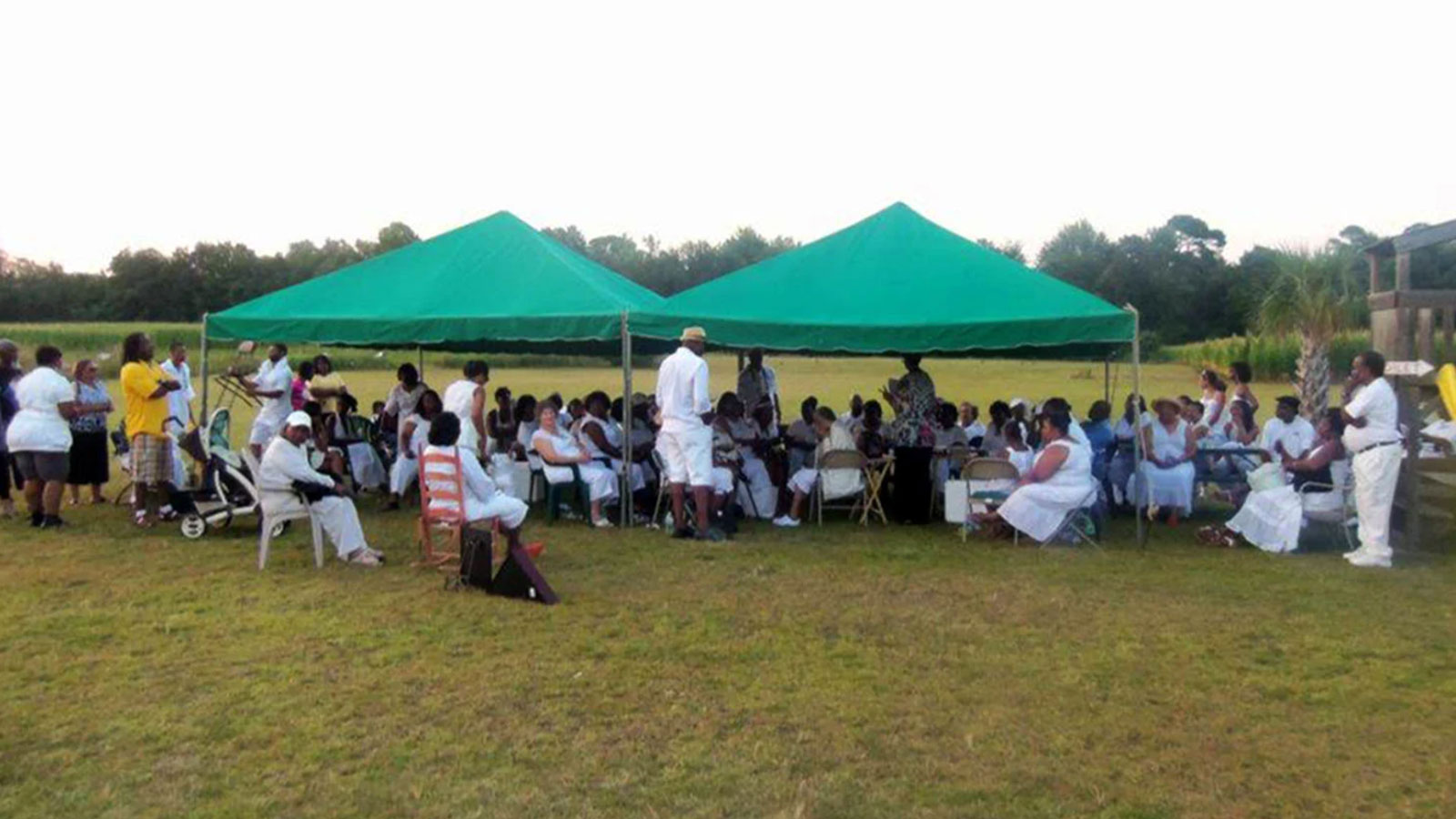A street sign on a dirt road leading up to a large plot of land in Nakina, North Carolina, lets you know you’re traveling down Roland Smith Lane. On that land sits a large white house — the only house standing on the 60-acre plot — that has become a vacation home for several generations of the Smith family to gather at.
The Smiths say they have done everything right to hold on to their land — and they have no intention of selling. Still, Evelyn S. Booker, who inherited the land from their mother, Esther Smith Morse, says she and her seven siblings receive letters and texts weekly from developers with offers to buy.
- A home built by Evelyn Booker’s sister on land purchased by their grandfather in Nakina. (Courtesy Evelyn Booker)
- Evelyn Booker’s extended family gathers regularly on land passed down for generations. (Courtesy Evelyn Booker)
“We’ve established that if anyone wants to sell their property, they will do so to a sibling and not an outsider,” Booker said.
By 1910, Black Americans like Smith’s ancestors had acquired a cumulative 16 million acres of rural land, according to the American Economic Association. But over the century that followed, 90% of that land was lost because of threats, violent force or systematic rejection from programs offered to white landowners to help keep land through economic hardships like the Great Depression.
With distrust of local governments, which had been charged with regulating property ownership in Southern states hostile to Black equality, and legal systems that had shut out Black families, many took informal routes to pass down ownership. Attorneys and others who work to help landowners gain clear title to their land say that for decades, countless Black property owners simply passed their land on to heirs through word of mouth. But instead of guaranteeing generational wealth, the lack of clear ownership on paper has created headaches and, at worst, opened families up to losing their land in the end.
Those vulnerabilities create a perfect storm for what’s known as an heirs’ property hunter.
“The rate of — and I’m going to call it what I think it is: land theft — is not only egregious but should be considered criminal and is being exploited by people with legal backgrounds, ties to local tax offices and courts,” said Ryan Thomson, an assistant professor of agriculture economics and sociology at Auburn University in Alabama.
Developers take advantage of the makeup of such informal arrangements, in which all the heirs have equal stakes in and ownership of their families’ land.
And with each generation, the number of heirs tends to increase, making it more difficult to prove ownership.
Without clear ownership, each person owns only a fractional stake in a property, not a specific physical piece of the land. So if an heirs’ hunter purchases the ownership of one heir, it can force the other owners into court to define their ownership interests in the land, which they usually can’t do. Once a property hunter is successful in purchasing the entirety of the land, he or she can flip it for a larger profit.
Thomson also works with the Southern Rural Development Center, training extension agents, lawyers and nonprofit groups on how to help heirs’ property owners navigate conflicts to get their legal houses in order.
When Thomson works in western Alabama, in predominantly Black counties like Wilcox and Lowndes, “and you see the lion’s share of land is under some white man’s name who is a descendant of a former judge, you are starting to pick up on some of these patterns,” Thomson said.
In South Carolina, the Center for Heirs’ Property Preservation has offered legal education and direct legal services for families that want to hold on to their generational land. Families most often arrive already in dire straits, legally and economically, because of situations caused by heirs’ property.
Because ownership of such properties can be so muddy, heirs typically “can’t get loans to improve homes, can’t get FEMA grants or use their property for collateral,” said Josh Walden, the chief of operations. “A lot of clients are relegated to motor homes because they can’t build a house on the property.”
Predatory developers consider a group of mobile homes on a property a sign that there may be an opportunity to grab property at less than its actual value. Or heirs’ property hunters could persuade individual family members to sell their shares, giving them the same rights to the land as the family members.
“You basically have a new family member,” said Walden, who added that sometimes family members mistakenly believe they can sell their shares while keeping everyone else’s allotment safe.
But Walden said that without clear titles, inheritors are considered “tenants in common.” So, for example, 10 siblings may believe each of them owns one of the 10 acres left to them by their parents. But without a will specifying exactly which portion of land they each own, they really own a tenth of each acre, instead of 100% of one acre.
For some families that haven’t kept family records and updated legal documents, the process to get clear titles and deeds may be lengthy and expensive.
Jaavon Garrett-Collier had been trying to get a clear title on her family’s land in Rembert, South Carolina, for nearly a decade when she turned to the Center for Heirs’ Property Preservation.
“I got bad information from some attorneys and wasted a lot of time,” Garrett-Collier said.
Her family’s 10 acres of land started as 97 acres that her great-grandfather Harrison Wingfield Johnson purchased for $3,000 in 1945. Johnson willed it to his children, including Garrett-Collier’s grandfather. But when her grandfather died, he didn’t leave a will.
Garrett-Collier took on the task of making sure the remaining land was divided properly so each inheritor would have a deed to his or her property, a process the center assisted with.
“We wanted each property to have taxes in the owner’s names and that person to be responsible for those taxes,” she said.
She had to explain it to her elder relatives, some of whom had never paid taxes on the property. She had to collect documents from cousins strewn across the country and keep others abreast of the steps being taken.
“It is important to identify one person from each branch of the family to receive and convey information,” she said. “Thank goodness there are only six of us.”
Her family is close to having deeds and clear titles for everyone who inherited some of the family property. Not everyone will be satisfied. Some relatives will inherit less property than others. But Garrett-Collier is trying to honor her grandparents’ wishes.
“My grandmother wanted to hold on to something for their children. This land is a blessing,” she said. “She held on to this land so if her children wanted to come back, they will always have a place to live.”
Crystal Richardson is among the small number of attorneys who specialize in heirs’ property law. Richardson practices in North Carolina, which has among the highest concentrations of likely heirs’ property, according to a study last year by Fannie Mae and the Housing Assistance Council.
“When it comes to heirs’ property matters, my clients tend to be land rich and cash poor,” Richardson said. “They generally want to preserve their family-owned land for future generations to come because of their ancestral connection to the land.”
Historically, resources for land loss prevention have been sparse. However, she is encouraged that more people are becoming aware of heirs’ property issues, especially through recent documentaries like “Silver Dollar Road” and “Gaining Ground: The Fight for Black Land.”
She said anyone who may inherit property should keep accurate records of family information, such as a detailed family tree, which can help wrangle who is entitled to what. She also suggests anyone over age 18 “should at least have a last will and testament” to help minimize some of the questions around property ownership. If you have family-owned land, Richardson recommends having regular family meetings to discuss management and make important decisions about the property to ease future conflict and confusion.
“You might also consider creating an entity such as a family LLC or trust to manage the property, so that the responsibility does not just fall on one or a few family members,” she said. “As generations pass on, these family members may not be able to continue on with these responsibilities and the younger generations may not have the same connection to the land as the older ones do.
“If disputes later arise and your family cannot make unanimous decisions about the property, then you may have to get the courts involved to resolve the issues,” she added. “When that happens, everybody loses. Your only options later may be to mediate or buy out family members.”

Evelyn Booker. (Courtesy Evelyn Booker)
Evelyn Booker, whose family has been through the process, said she encourages other Black landowners to do the work necessary to maintain clear and legal title to their property. She said she knows there’s keen interest in her family’s land because of how close it is to water. The family’s 60 acres in Nakina are an hour from Wilmington, North Carolina, and a half-hour from Myrtle Beach, South Carolina. But the descendants of Roland and Eulah Bell Long Smith say they aren’t selling.
“Our grandparents gave the land to their children. Our parents farmed the land. We were self-sufficient,” Booker said. She keeps a box full of letters from developers making offers.
“The older siblings — after our father passed — got together and paid back taxes so we could keep the land in the family, and then we subdivided the land and we each had our own acreage.”
Her grandfather, who purchased the land, left a will giving the land to his children. Then her parents, the second generation, did the same, leaving the land to Booker and her siblings. They grew up knowing there were neighbors who had bought other land by paying off back taxes and white farmers who had ordered local banks to not make loans to Black farmers.

Image of Eula and Roland Smith, Evelyn Booker’s parents. (Courtesy Evelyn Booker)
Today, some of the siblings earn money from the timber on their land, and the entire family rents some of the land to local farmers.
“The farmers, they plant, and whatever they sell they show us receipts, and we get a percentage of that. We get a little check at the end of the season,” Booker said. “The land just keeps giving.”

A street sign reads Roland Smith Lane. (Courtesy Evelyn Booker)
Meanwhile, generations of the family have gathered there for special occasions.
“There is an emotional aspect to land,” Booker said. She has a great-niece whose short film, called “Bug Hill,” is about the family’s connection to its property. The film has been featured at festivals and on PBS. “You can walk on that land, and when we are there, especially in the backyard, it’s like you can feel the presence of our parents,” Booker said. “A lot happened on that 60 acres of land. We’re not going to give any of it away.”
Source: NBC News
















